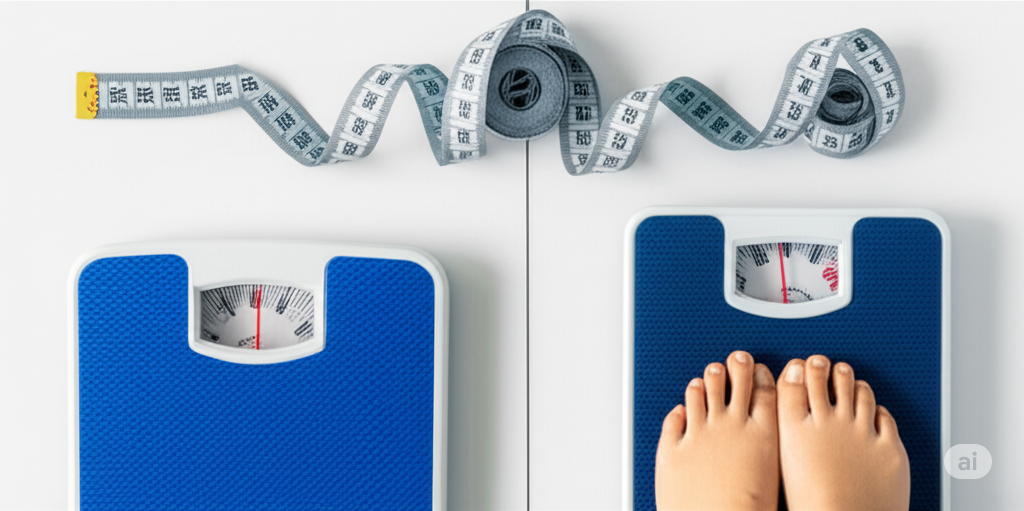The terms “weight loss” and “fat loss” are often used interchangeably, leading to confusion about the true goals of a healthy lifestyle. While both involve a reduction in your overall mass, they represent different aspects of body composition, and understanding this distinction is crucial for achieving sustainable and positive health outcomes.
What is Weight Loss?
Simply put, weight loss refers to a decrease in your total body weight. This number on the scale encompasses everything that makes up your body, including:
- Fat: Both subcutaneous (under the skin) and visceral (around organs) fat.
- Muscle: Lean tissue responsible for strength and metabolism.
- Water: Fluctuations in hydration levels can significantly impact weight.
- Bone: The structural framework of your body.
- Organs: Essential tissues that perform vital functions.
- Glycogen: Stored carbohydrates for energy.
- Waste products: Contents in your digestive system.
Therefore, when you step on the scale and see a lower number, it doesn’t necessarily tell you what you’ve lost – it could be a combination of any or all of the above.
What is Fat Loss?
Fat loss, on the other hand, specifically refers to a reduction in the amount of adipose tissue (body fat) in your body. This is the primary goal for most people seeking to improve their health, physique, and reduce the risk of chronic diseases associated with excess body fat.
Why the Difference Matters
Focusing solely on weight loss can be misleading and even detrimental. For instance, someone might lose weight rapidly through a restrictive diet, but a significant portion of that loss could be muscle mass and water, rather than actual fat. This can lead to a slower metabolism, reduced strength, and an increased likelihood of regaining the lost weight (and sometimes more) in the long run – the dreaded “yo-yo” dieting effect.
Conversely, someone might be engaging in regular strength training and a balanced diet and notice the scale isn’t dropping drastically, but their clothes are fitting better, and they look leaner. This is because they might be losing fat while simultaneously gaining muscle, which is denser than fat. In this scenario, while the overall weight might not change much, their body composition is significantly improving – a much more desirable outcome.
How to Prioritize Fat Loss Over Weight Loss
Here are some strategies to focus on losing fat rather than just weight:
- Prioritize Strength Training: Resistance exercises help build and preserve muscle mass during a calorie deficit, encouraging your body to burn fat for energy.
- Focus on a Balanced Diet: Emphasize whole, unprocessed foods rich in protein, fiber, and healthy fats. Protein is crucial for muscle repair and growth, while fiber and healthy fats promote satiety and help regulate blood sugar levels. Avoid overly restrictive diets.
- Create a Moderate Calorie Deficit: Aim for a sustainable calorie deficit through a combination of diet and exercise. Rapid and extreme calorie restriction is more likely to lead to muscle loss.
- Stay Hydrated: Drinking enough water is essential for various bodily functions, including fat metabolism.
- Get Adequate Sleep: Sufficient sleep helps regulate hormones that control appetite and metabolism.
- Manage Stress: Chronic stress can lead to increased cortisol levels, which can promote fat storage, particularly around the abdomen.
- Track Progress Beyond the Scale: Use a measuring tape to monitor changes in waist circumference, take progress photos, and pay attention to how your clothes fit. These are often better indicators of fat loss than just the number on the scale.
In Conclusion
While weight loss might be the initial metric you observe, understanding the difference between fat loss and weight loss is vital for achieving your health and fitness goals effectively. Prioritizing strategies that promote fat loss while preserving muscle mass will lead to a healthier, leaner, and more sustainable outcome in the long run. Don’t just chase a number on the scale; focus on improving your body composition for lasting well-being.













Leave a Reply